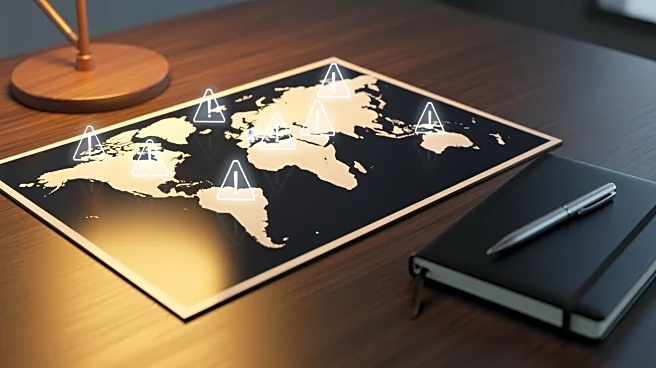What's Happening?
Germany and the U.K. have updated their travel advisories for Venezuela, warning citizens of a tense security situation that could rapidly deteriorate. This comes as President Trump deploys warships to
the Caribbean to pressure Venezuelan President Nicolás Maduro over alleged drug cartel activities. The U.S. is considering designating the Cartel de los Soles, allegedly led by Maduro, as a foreign terrorist organization. The U.S. Federal Aviation Administration has warned pilots to exercise caution when flying over Venezuela due to the security risks. Several airlines have canceled flights to Venezuela, and other countries like South Korea have issued travel bans for certain Venezuelan regions.
Why It's Important?
The U.S. government's actions against Venezuela are part of a broader strategy to curb drug smuggling into the U.S. by targeting the Cartel de los Soles. This move could escalate tensions in the region, potentially leading to a larger conflict. The travel warnings and military maneuvers indicate a significant shift in U.S. foreign policy towards Venezuela, which could impact international relations and trade. The situation also highlights the geopolitical complexities of U.S. intervention in Latin America, with potential implications for regional stability and international diplomacy.
What's Next?
As the U.S. ramps up operations around Venezuela, other countries may issue similar travel warnings. The situation could lead to increased military activity and further diplomatic tensions. The international community will be closely monitoring the developments, and there may be calls for multilateral discussions to address the crisis. The U.S. may continue to build its military presence in the Caribbean, potentially leading to more confrontations with Venezuelan forces.
Beyond the Headlines
The designation of the Cartel de los Soles as a terrorist organization could have long-term implications for U.S.-Venezuela relations. It raises ethical questions about the use of military force in foreign policy and the impact on civilian populations. The situation also underscores the challenges of addressing transnational crime and drug trafficking through unilateral actions. The broader implications for international law and human rights could be significant, as countries navigate the balance between security and sovereignty.








